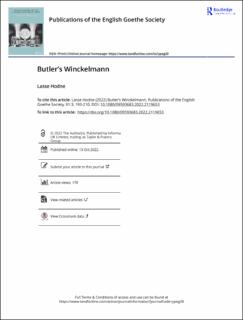Butler's Winckelmann
Peer reviewed, Journal article
Published version
Permanent lenke
https://hdl.handle.net/11250/3053051Utgivelsesdato
2022Metadata
Vis full innførselSamlinger
Originalversjon
Publications of the English Goethe Society. 2022, 91 (3), 193-210. 10.1080/09593683.2022.2119653Sammendrag
The book The Tyranny of Greece over Germany (1935) by Eliza Marian Butler is about the development of German intellectual life in the period from Johann Joachim Winckelmann (1717–1768) onwards. Winckelmann is often seen as the man who gave the impetus to a wave of philhellenism in Germany. According to Butler, German intellectuals’ nostalgic longing for Greece and lack of interest in real societal problems bears much responsibility for the cultural collapse of interwar Germany and the rise of Nazism. The ideas that Butler put forward have been of great importance for those who criticize the political use of classical art in public monuments. Discussing Butler’s points of view, this article will take a critical look at her reasons for attributing such a central role in the cultural decline of interwar Germany to Winckelmann’s philhellenism.

